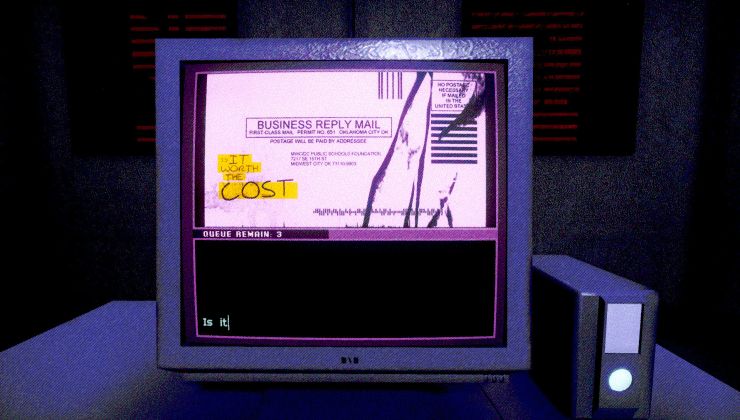Well there it is! MSI Claw A1M is the official name of the next big vendor to jump into the handheld gaming space to take on the likes of the Steam Deck, ROG Ally and the Lenovo Legion Go. Unlike the Steam Deck which runs SteamOS Linux, once again we have a vendor going with Windows 11.
From the press release: "In our commitment to enhancing the gaming experience for our users, we aim to address market pain points and dedicate efforts to the handheld space,” said Eric Kuo, the Executive Vice President& NB BU GM of MSI. “We have fine-tuned specific designs tailored exclusively for gamers, debuting our very first handheld, Claw, which redefines the standards in the handheld market."
MSI say it offers MSI Cooler Boost Hyperflow technology, featuring dual fans and heat pipes that efficiently dissipate heat, and that the intraflow thermal design optimizes airflow to cool internal components "ensuring top gaming performance". They're also bringing their "MSI Center M UI" to it giving quick-access to various features and settings like a game launcher. So once again, it's another UI being slapped on top of Windows.
The official specs sheet is below:
| Claw A1M | |
| Processor | Up to Intel® Core™ Ultra 7 processor 155H |
| Operating System | Windows 11 |
| Chipset | Integrated SoC |
| Memory | LPDDR5 onboard, 16GB, dual channel |
| Display | 7" FHD (1920 x 1080), 120 Hz Refresh Rate, Touch Screen, 120 Hz Refresh Rate, 100% sRGB(Typical), 500nits(Typical), IPS-Level panel |
| Graphics | Intel® Arc Graphics |
| Storage Slot | 1 x NVMe M.2 2230 SSD by PCIe Gen 4 x4 |
| Sensor | 6-Axis IMU Vibration Motor |
| Communication | Intel® Killer™ Wi-Fi 7 BE1750, Bluetooth v5.4 |
| Audio | 2 × 2W Speakers / 1× Audio combo jack / Hi-Res Audio readyk |
| I/O Ports | 1 x Thunderbolt™ 4 / DP/ USB Type-C (w/ PD 3.0 Charging) 1 x microSD Card Reader 1 x Audio combo jack 1x Power button with Finger Print Sensor |
| Battery/Adapter | 6-Cell, Li-Polymer, 53Whr / 65W USB Type-C PD 3.0 |
| Dimension | 294 (W) x 117(D) x 21.2(H) mmn |
| Weight | 675 g |
I'm always happy to see more competition for the Steam Deck, but it remains to be seen just how it will perform. And it will come in multiple different configurations with different storage. In terms of performance, from what I've seen from YouTube videos like Dave2D it's quite limited as they weren't allowed to do much yet on benchmarking but it's somewhat comparable to the ROG Ally. Again though, it seems another case of it needing to draw more power for better performance.
The MSI Claw releases sometime in the first half of 2024.
There're multiple markets build around minimizing open platform risks. From copyleft compliance firms, to adblock detection, to hardware ip security development, to security audit firms.i kinda of understand what you said, but can you explain it a bit more?
Microsoft learned the hard way and nowadays plays the game quite well.
Google has spend its entire existence in the danger zone.
Apple uses a hardline approach, which limits their choices and still results in clashes from time to time.
Nintendo seems to have accepted it as a form of rot.
Sony actively fights it, with varying levels of success.
Hardware developers play from a position of strength and still Nividia flinches every major Nouveau update.
Gaming vendors hide behind Microsoft.
to be more specific the specific relationship between companies and foss.
i kinda of understand what you said, but can you explain it a bit more?
to be more specific the specific relationship between companies and foss.
In a corporate environment, decisions get made from the top down. So unless an exec or middle manager delegates a decision to a lower more technical level, they make the decision based on "advice" from industry giants, such as IBM/Oracle/Microsoft/Adobe/etc...
These industry giants spend a lot of money on ensuring they stay de-facto by providing contracts that let them take on some of the liability in case something goes wrong.
(Yes, it's really just a way of passing the buck)
So executives/middle-managers go with the easy option and get an "expert" from one of these de-facto companies to make the decision for them, because that way they can honestly say they left the technical decision to experts, so can't be held liable if something goes wrong.
FOSS often doesn't make business sense unless they are significantly cheaper or become de-facto in some way. Cheap has a stigma of being inferior.
Another dynamic is that proprietary is seen as a form of ownership/control. So corporate will see if they can use it as a way of excluding competition in some way. Therefore it's rare that source code for a non--core-business-path tool ever gets released, even when it loses relevance. All in the name of building a large library of IP. You can then use this huge library of near-useless IP to negotiate a trade agreement with another corporate.
There're multiple markets build around minimizing open platform risks. From copyleft compliance firms, to adblock detection, to hardware ip security development, to security audit firms.i kinda of understand what you said, but can you explain it a bit more?
Microsoft learned the hard way and nowadays plays the game quite well.
Google has spend its entire existence in the danger zone.
Apple uses a hardline approach, which limits their choices and still results in clashes from time to time.
Nintendo seems to have accepted it as a form of rot.
Sony actively fights it, with varying levels of success.
Hardware developers play from a position of strength and still Nividia flinches every major Nouveau update.
Gaming vendors hide behind Microsoft.
to be more specific the specific relationship between companies and foss.
Although Grigi isn't fully wrong it's deeper than that and management isn't the only issue.
At first I'm going to be a little bit generalizing, but I promise the point will be clear.
Further on I will give a little bit more refinement.
Foss and companies like each other, because they provide each other with tools to achieve their goals.
Foss and companies don't like each other, because they actively fight each other when their goals don't match.
Foss wants computers to be a sandbox where everyone can play as long as they don't actively hurt each other.
Companies want to be so much better than the others at working with computers that people are going to pay them to do the things they do well.
In the basic this isn't a problem, but in practice they sometimes clash.
For example:
When 5 billion people are all active with computers there is a serious chance that there is someone else who might be just as good or just slightly worse at what you do with computers.
That's a problem for the companies, because if that is the case they are suddenly in a race to the bottom with that someone else.
They would prefer it if some things with computers required a very limited resource they possessed, so doing way better than everybody else became easy, which often leads them to walling off parts of the sandbox.
The Foss people don't like walling off parts of the sandbox and actively sabotage it.
The risk of getting sabotaged is scary for companies.
Companies mitigate such risks often by paying outside companies who are specialized in mitigating these risks.
Refinement:
There're actually a few quite anti-cooperate voices within the Foss community and anti-foss voices within cooperate and those tend to spark smaller conflicts of their own. Internal and external.
I'm right now splitting over the lines of Foss and cooperate, because that is what the question was, but it's obviously an arbitrary line.
With this information why did I argue that "they've a basic and grounded proprietary cooperate fear of open platforms".
First I specifically defined "proprietary" cooperate.
Proprietary is a foss slur for non/anti-foss. I used it to separate cooperate in those that wall off parts of the sandbox and those that don't.
Second I called their fear grounded for the aggressive stance some of the foss people have taken towards those walling off parts of the sandbox.
After that I presented some examples of proprietary companies and how they dealt with this.
Minor observation: I don't think it's so much a fear of sabotage that's the issue, but more a fear of non control.
If you don't have adequate control sometimes the only thing you can do is race to the bottom and see whom blinks first.
There are many cases where Corporate and FOSS is working together happily, It depends on control being managed well.
e.g. Python, Containers, Linux kernel, etc...
Those projects have controlling foundations that basically exists to ensure that everyone plays by the rules.
Edit:
And also, the cooperation usually can only exist outside the core business of said corporate.
E.g. Microsoft is relative linux friendly thesedays, but much less so on e.g. office suite software. They don't make money on Windows any more, but to keep the money coming in from Office/Partners/Consulting it's in their interest to build barriers against the Linux desktop.
Last edited by grigi on 11 Jan 2024 at 10:31 pm UTC
Something to keep in mind is that not all corporations are software corporations, and many of those non-software corporations have employees who can code. Those corporations don't have the same conflict--the only reason they have for sometimes not liking FOSS is instinct. But fundamentally, they only gain from FOSS, and this is probably a key reason for FOSS success.There're multiple markets build around minimizing open platform risks. From copyleft compliance firms, to adblock detection, to hardware ip security development, to security audit firms.i kinda of understand what you said, but can you explain it a bit more?
Microsoft learned the hard way and nowadays plays the game quite well.
Google has spend its entire existence in the danger zone.
Apple uses a hardline approach, which limits their choices and still results in clashes from time to time.
Nintendo seems to have accepted it as a form of rot.
Sony actively fights it, with varying levels of success.
Hardware developers play from a position of strength and still Nividia flinches every major Nouveau update.
Gaming vendors hide behind Microsoft.
to be more specific the specific relationship between companies and foss.
Although Grigi isn't fully wrong it's deeper than that and management isn't the only issue.
At first I'm going to be a little bit generalizing, but I promise the point will be clear.
Further on I will give a little bit more refinement.
Foss and companies like each other, because they provide each other with tools to achieve their goals.
Foss and companies don't like each other, because they actively fight each other when their goals don't match.
Foss wants computers to be a sandbox where everyone can play as long as they don't actively hurt each other.
Companies want to be so much better than the others at working with computers that people are going to pay them to do the things they do well.
In the basic this isn't a problem, but in practice they sometimes clash.
For example:
When 5 billion people are all active with computers there is a serious chance that there is someone else who might be just as good or just slightly worse at what you do with computers.
That's a problem for the companies, because if that is the case they are suddenly in a race to the bottom with that someone else.
They would prefer it if some things with computers required a very limited resource they possessed, so doing way better than everybody else became easy, which often leads them to walling off parts of the sandbox.
The Foss people don't like walling off parts of the sandbox and actively sabotage it.
The risk of getting sabotaged is scary for companies.
Companies mitigate such risks often by paying outside companies who are specialized in mitigating these risks.
Refinement:
There're actually a few quite anti-cooperate voices within the Foss community and anti-foss voices within cooperate and those tend to spark smaller conflicts of their own. Internal and external.
I'm right now splitting over the lines of Foss and cooperate, because that is what the question was, but it's obviously an arbitrary line.
With this information why did I argue that "they've a basic and grounded proprietary cooperate fear of open platforms".
First I specifically defined "proprietary" cooperate.
Proprietary is a foss slur for non/anti-foss. I used it to separate cooperate in those that wall off parts of the sandbox and those that don't.
Second I called their fear grounded for the aggressive stance some of the foss people have taken towards those walling off parts of the sandbox.
After that I presented some examples of proprietary companies and how they dealt with this.
Something to keep in mind is that not all corporations are software corporations, and many of those non-software corporations have employees who can code. Those corporations don't have the same conflict--the only reason they have for sometimes not liking FOSS is instinct. But fundamentally, they only gain from FOSS, and this is probably a key reason for FOSS success.There're multiple markets build around minimizing open platform risks. From copyleft compliance firms, to adblock detection, to hardware ip security development, to security audit firms.i kinda of understand what you said, but can you explain it a bit more?
Microsoft learned the hard way and nowadays plays the game quite well.
Google has spend its entire existence in the danger zone.
Apple uses a hardline approach, which limits their choices and still results in clashes from time to time.
Nintendo seems to have accepted it as a form of rot.
Sony actively fights it, with varying levels of success.
Hardware developers play from a position of strength and still Nividia flinches every major Nouveau update.
Gaming vendors hide behind Microsoft.
to be more specific the specific relationship between companies and foss.
Although Grigi isn't fully wrong it's deeper than that and management isn't the only issue.
At first I'm going to be a little bit generalizing, but I promise the point will be clear.
Further on I will give a little bit more refinement.
Foss and companies like each other, because they provide each other with tools to achieve their goals.
Foss and companies don't like each other, because they actively fight each other when their goals don't match.
Foss wants computers to be a sandbox where everyone can play as long as they don't actively hurt each other.
Companies want to be so much better than the others at working with computers that people are going to pay them to do the things they do well.
In the basic this isn't a problem, but in practice they sometimes clash.
For example:
When 5 billion people are all active with computers there is a serious chance that there is someone else who might be just as good or just slightly worse at what you do with computers.
That's a problem for the companies, because if that is the case they are suddenly in a race to the bottom with that someone else.
They would prefer it if some things with computers required a very limited resource they possessed, so doing way better than everybody else became easy, which often leads them to walling off parts of the sandbox.
The Foss people don't like walling off parts of the sandbox and actively sabotage it.
The risk of getting sabotaged is scary for companies.
Companies mitigate such risks often by paying outside companies who are specialized in mitigating these risks.
Refinement:
There're actually a few quite anti-cooperate voices within the Foss community and anti-foss voices within cooperate and those tend to spark smaller conflicts of their own. Internal and external.
I'm right now splitting over the lines of Foss and cooperate, because that is what the question was, but it's obviously an arbitrary line.
With this information why did I argue that "they've a basic and grounded proprietary cooperate fear of open platforms".
First I specifically defined "proprietary" cooperate.
Proprietary is a foss slur for non/anti-foss. I used it to separate cooperate in those that wall off parts of the sandbox and those that don't.
Second I called their fear grounded for the aggressive stance some of the foss people have taken towards those walling off parts of the sandbox.
After that I presented some examples of proprietary companies and how they dealt with this.
They have the same conflict, just a lot less.
The New York Times would be better off if they were the only one who could write articles on the internet.
A bank would be better off if they were the only ones with some superior database software.
Car companies fill their cars with spyware and drm.
...once again we have a vendor going with Windows 11.That's enough reading for me.








 How to set, change and reset your SteamOS / Steam Deck desktop sudo password
How to set, change and reset your SteamOS / Steam Deck desktop sudo password How to set up Decky Loader on Steam Deck / SteamOS for easy plugins
How to set up Decky Loader on Steam Deck / SteamOS for easy plugins
See more from me